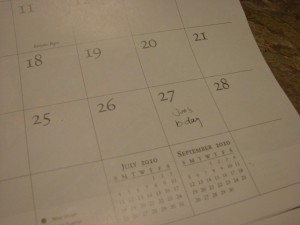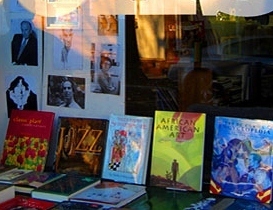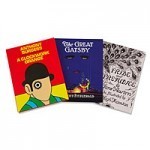Angela Joseph's Blog, page 28
March 1, 2013
Are You Accomplishing Your Goals?
 Even though the month ended yesterday, I am scratching my head trying to remember what happened in February. Where did the days go? Will March vanish in the same way, with hardly a whisper, leaving no trace of its journey here on earth? Well, I do remember some things. For one, it was my birth month, which meant I’m one year older and have one year less to do the things I want to do. My oldest son also had a birthday in February and my car, which has never given me any trouble in the eleven years I’ve had it, broke down. And after months of talking to a travel agent, my plans to cruise the Mediterranean finally went into high gear.
Even though the month ended yesterday, I am scratching my head trying to remember what happened in February. Where did the days go? Will March vanish in the same way, with hardly a whisper, leaving no trace of its journey here on earth? Well, I do remember some things. For one, it was my birth month, which meant I’m one year older and have one year less to do the things I want to do. My oldest son also had a birthday in February and my car, which has never given me any trouble in the eleven years I’ve had it, broke down. And after months of talking to a travel agent, my plans to cruise the Mediterranean finally went into high gear.
Also in February I continued to work at my day job as an occupational therapist and at home I plodded away at the second in my Egypt novel series. In addition, I’ve been updating this blog and my Christian devotional blog while posting to my church’s website. I’ve also started writing again for Hubpages and participating in a little social media here and there. And, I almost forgot, I worked on a synopsis for someone. Not bad for someone with an almost full-time job. Now I don’t feel so guilty after all.
So here we are in March. A new month with new opportunities. I’m going to try my best to spice up my blog, work on my About page and make a better effort to get myself on the road to retirement. Oh, I also want to read more. I find that when I read good books my writing flows better. How about you? Have you started on your 2013 goals? Are things going according to plan? Don’t beat yourself up if you find you are not accomplishing things as fast as you would like. Just keep your goals in front of you and keep working on them. You may be slowed by other things, but try to do a little every day. Remember, the race is not for the swiftest, but he who endures to the end. Keep at it!
February 17, 2013
Welcome
Welcome to my blogsite, a place where I share my thoughts, ideas and materials gained from my research on writing. My goal in posting these articles is to interact with other writers who are passionate about the art of writing and in doing so, elevate the standard of my work and that of others. I firmly believe that writing is one of the loftiest professions there is. After all, this is how news and information were disseminated since the beginning of time and it continues to this day, despite the many other avenues of communication now available. So, feel free to browse the site where you’ll find articles on writing as well as health topics which I hope you’ll find helpful. And please don’t forget to leave a comment.
February 7, 2013
How To Craft A Captivating Opening – II

In my last post, I wrote about how important it is to craft a strong opening. One that hooks the reader and makes her want to continue reading. I also listed three openings that are not very captivating and three from famous, classical authors. Now here are some first lines from contemporary works on my bookshelf:
It was my first day. I had come the night before, a gray-black and cold night before-as it was expected to be in the middle of January, though I didn’t know that at the time -
Lucy – Jamaica Kincaid 1990
Here is the house. It is green and white. It has a red door. It is very pretty. Here is the family. Mother, Father, Dick, and Jane live in the green-and-white house.
The Bluest Eye – Toni Morrison 1994
The day she walked the streets of Silk, a chafing wind kept the temperature low and the sun was helpless to move outdoor thermometers more than a few degrees above freezing.
Love – Toni Morrison 2003
“Any day now!” Anya shouted, as the car in front of her remained motionless even though the other lanes were inching forward.
Joy – Victoria Christopher Murray 2001
After eight months spent in the obscurity of our mother’s womb, my brother, Shiva, and I came into the world in the late afternoon of the twentieth of September in the year of grace 1954.
Cutting For Stone - Abraham Verghese 2009
It happened every year, was almost a ritual. And this was his eighty-second birthday. When, as usual, the flower was delivered, he took off the wrapping paper and then picked up the telephone to call Detective Superintendent Morell who, when he retired, had moved to Lake Siljan in Dalarma.
The Girl With The Dragon Tattoo – Stieg Larsson 2009
I have read and enjoyed all but the last two. I’m in the process of reading Cutting For Stone. The last one I’ve not yet begun, but from what I’ve heard, it’s a powerful book. From the above, you may have made the same observation that I have – that only one of them began with a direct quotation and with some type of action. An impatient young woman shouting at the driver in front of her to move it.
All of the other opening lines seem to usher us gently into the story, but in such a way that even though we may be hesitant to enter, our curiosity still gets the better of us. Let’s look at the first one. It was my first day. I had come the night before, a gray-black and cold night before-as it was expected to be in the middle of January, though I didn’t know that at the time - My first day of what? Where had she come from? Why didn’t she know that at the time? Without posing a question, the author puts questions in the mind of the reader.
I like the first one by Toni Morrison. This author has the gift of getting into the character’s mind so precisely that her words come over exactly as that character would have expressed them. These opening lines make us want to know about this young girl who turns out to be as simplistic as the words.
According to Writer’s Relief, opening lines should do some or all of the following:
Establish tone
• Hint at conflict or theme
• Lure with the promise of some reward (reward meaning: the emotional reward of reading the book)
• Cause an instant emotional reaction, connection to character, and/or fascination with scene
Do the openers above do any of that for you? What do you like or don’t like about them? What are some of your favorite opening lines? Or, have you written a killer opener for your book or novel? Drop me a comment and let me know.
——————————————————————–
Here are two books that will help you to craft captivating openings:
January 20, 2013
How To Craft A Captivating Opening
Do you agonize over the opening of your novel? Do you rewrite and rewrite until you barely recognize the first paragraph you wrote just minutes ago? With all the emphasis on captivating or hooking your readers, moreso your agent, most writers really sweat over that first paragraph.
To get some idea as to what the experts consider captivating, I took Leads and Story Openings by Robert Walker off my bookshelf. It’s a book I purchased when I first began writing seriously. According to Walker, your lead should
Get Attention
Set tone of the piece
Create an interest factor
In other words, make you want to read the book. Let’s look at two examples Walker gave. The first of each is a poor to average attention getter; the second is the better one.
The last flight to Cuzco was due to leave in an hour and a half. Yet our tickets had not yet arrived. What were we to do?
Here’s the better lead according to Walker:
“No tickets!There are no tickets, no reservation under your name. Please step aside for the next customer,” she said.
Here’s another example:
One night while I was working late at the church office, a man knocked on the door. He appeared distressed and had a woman with him whom I recognized as a member of our congregation.
The better one:
“I’ve just kidnapped this girl,” the man shouted. Waving a gun he stood before me with his captive, a young woman I recognized as Delissa, a member of our church.
From these two examples, Walker seems to favor a lead that begins with some type of dialog. In his own words: Note the techniques: direct quotes, narrative-type lead, clear description of the scene and its people. However, if you take a look at some of the most famous opening paragraphs, you will see that none of these elements are present.
It was the best of times, it was the worst of times, it was the age of wisdom, it was the age of foolishness, it was the epoch of belief, it was the epoch of incredulity, it was the season of Light, it was the season of Darkness, it was the spring of hope, it was the winter of despair, we had everything before us, we had nothing before us, we were all going to heaven, we were all going direct the other way – in short, the period was so far like the present period, that some of its noisiest authorities insisted on its being received, for good or for evil, in the superlative degree of comparison only.
“A Tale of Two Cities” by Charles Dickens (1859)
If you really want to hear about it, the first thing you’ll probably want to know is where I was born, and what my lousy childhood was like, and how my parents were occupied and all before they had me, and all that David Copperfield kind of crap, but I don’t feel like going into it. In the first place, that stuff bores me, and in the second place, my parents would have about two hemorrhages apiece if I told anything pretty personal about them.
“The Catcher in the Rye” by J. D. Salinger (1951)
Through the fence, between the curling flower spaces, I could see them hitting. They were coming toward where the flag was and I went along the fence. Luster was hunting in the grass by the flower tree. They put the flag back and they went to the table, and he hit and the other hit. Then they went on, and I went along the fence. Luster came away from the flower tree and we went along the fence and they stopped and we stopped and I looked through the fence while Luster was hunting in the grass.
“The Sound and the Fury” by William Faulkner (1929)
These are three of the more famous openers that have remained on the iconic list throughout the ages. What do you think of them? Do they really spur you to read the book, or does the opening impress you after you have read the last line? Drop me a line and share your thoughts. Next post I will deal with a few contemporary opening paragraphs.
Crafting A Captivating Opening
Do you agonize over the opening of your novel? Do you rewrite and rewrite until you barely recognize the first paragraph you wrote just minutes ago? With all the emphasis on captivating or hooking your readers, moreso your agent, most writers really sweat over that first paragraph.
To get some idea as to what the experts consider captivating, I took Leads and Story Openings by Robert Walker off my bookshelf. It’s a book I purchased when I first began writing seriously. According to Walker, your lead should
Get Attention
Set tone of the piece
Create an interest factor
In other words, make you want to read the book. Let’s look at two examples Walker gave. The first of each is a poor to average attention getter; the second is the better one.
The last flight to Cuzco was due to leave in an hour and a half. Yet our tickets had not yet arrived. What were we to do?
Here’s the better lead according to Walker:
“No tickets!There are no tickets, no reservation under your name. Please step aside for the next customer,” she said.
Here’s another example:
One night while I was working late at the church office, a man knocked on the door. He appeared distressed and had a woman with him whom I recognized as a member of our congregation.
The better one:
“I’ve just kidnapped this girl,” the man shouted. Waving a gun he stood before me with his captive, a young woman I recognized as Delissa, a member of our church.
From these two examples, Walker seems to favor a lead that begins with some type of dialog. In his own words: Note the techniques: direct quotes, narrative-type lead, clear description of the scene and its people. However, if you take a look at some of the most famous opening paragraphs, you will see that none of these elements are present.
It was the best of times, it was the worst of times, it was the age of wisdom, it was the age of foolishness, it was the epoch of belief, it was the epoch of incredulity, it was the season of Light, it was the season of Darkness, it was the spring of hope, it was the winter of despair, we had everything before us, we had nothing before us, we were all going to heaven, we were all going direct the other way – in short, the period was so far like the present period, that some of its noisiest authorities insisted on its being received, for good or for evil, in the superlative degree of comparison only.
“A Tale of Two Cities” by Charles Dickens (1859)
If you really want to hear about it, the first thing you’ll probably want to know is where I was born, and what my lousy childhood was like, and how my parents were occupied and all before they had me, and all that David Copperfield kind of crap, but I don’t feel like going into it. In the first place, that stuff bores me, and in the second place, my parents would have about two hemorrhages apiece if I told anything pretty personal about them.
“The Catcher in the Rye” by J. D. Salinger (1951)
Through the fence, between the curling flower spaces, I could see them hitting. They were coming toward where the flag was and I went along the fence. Luster was hunting in the grass by the flower tree. They put the flag back and they went to the table, and he hit and the other hit. Then they went on, and I went along the fence. Luster came away from the flower tree and we went along the fence and they stopped and we stopped and I looked through the fence while Luster was hunting in the grass.
“The Sound and the Fury” by William Faulkner (1929)
These are three of the more famous openers that have remained on the iconic list throughout the ages. What do you think of them? Do they really spur you to read the book, or does the opening impress you after you have read the last line? Drop me a line and share your thoughts. Next post I will deal with a few contemporary opening paragraphs.
January 12, 2013
Should You Copyright Your Work

This question came to my mind the other day as I listened to my car radio while driving to work. The announcer said that all tweets are stored in the Library of Congress. Huh? Why would they go to all the trouble to collect and store all those inane lines we send into cyberspace. According to the announcer, the folks at that prestigious institution want to know our thoughts. Well, I thought, if they want my one-liners why not give them my masterpiece as well?
But seriously, copyright is serious business. Copyright infringement can send you before the courts. As an author, you probably know the meaning of copyright. In case you don’t, here it is: it is the protection of an author’s original work whether published or unpublished. This protection is obtained by registering your work with the US Copyright Office.
You must be aware that anything you create – school paper, books, music, any intellectual property – is automatically copyrighted. You don’t have to write the copyright symbol or the year for it to be copyrighted. However, if you want to protect your work from being used, copied, distributed or infringed upon by others, it is wise to copyright it. Doing so gives you certain advantages under the Copyright Act, among them the freedom to file a lawsuit against the person who committed the infringement. Here are some other facts concerning copyright:
What is The Poor Man’s Copyright
It’s a myth, that’s what it is. When I first began writing, I heard a lot about this. Writers thought it a good idea to do this in order to avoid expensive fees. But as you will see later on, the fees are not at all expensive. The Poor Man’s Copyright involves mailing a copy of your work to yourself and not opening it in order to establish the date of its existence. There is no protection with this method since your work is not registered with the US Copyright Office.
What is Fair Use
According to the US Copyright office, it is permissible to use “limited portions of a work including quotes” for certain purposes laid out in the Copyright Act, such as criticism, teaching, news reporting and research. So don’t assume because something is on the internet it is fair use. However, there are no legal stipulations as to the number of words you can use. Each case is examined on a case-by-case basis to determine whether infringement occurred.
Public Domain
This is different from Fair Use. When a work is in public domain, it has no copyright protection. As a rule of thumb, works created before 1923 are now in the public domain. Other works that are in the public domain are:
Works created by the US government
A work whose copyright has expired
The work was donated to the public domain by the owner
Certain Bible translations
Using Copyrighted materials in my book
If you wish to use someone’s work in your book, you must obtain their permission, preferably in writing. And don’t wait until a couple months before your book goes into print. If you don’t know who owns the copyright, you can do a search at the US Copyright’s website or office. All records from January 1978 to the present are available. For more info see http://www.copyright.gov/circs/circ22.... If you want the staff to conduct the search you will have to fork over $165 an hour for a 2-hour minimum search.
By now you may be thinking, it does make sense to copyright my work. You can now file electronically for a small fee of $35.00 (http://www.copyright.gov/eco/). This is a fast and secure method and costs the least. If you prefer to use a paper form, the cost is $65.00 payable by check or money order. As an author you will request form TX.
As authors we can be easily exposed to liability by being unaware of legal matters. You can find this and more information at http://www.copyright.gov or at www.LegalWritePublications.com.
December 23, 2012
What Are Your Goals For 2013?
As 2012 hurtles to a close and your mind tries to make sense of yet another senseless massacre, or the fiscal cliff or your Christmas shopping, or a myriad of other things, somewhere in the midst of all that, you are probably telling yourself you need to make some goals for 2013. But how do you start?
HubPages suggests you start with knowing what you want. But do you? I mean seriously, apart from knowing that you want to succeed at writing, what do you really want? The following tips may be helpful:
1. Know your interests. What excites you? What are you passionate about? Decide what that is and then write about it.
2. Become a niche expert. When you unleash your passion, you acquire knowledge and expertise which will help you uncover your niche. Niche writers are like established businesses. Think WalMart for inexpensive goods, Best Buy for electronics, Hersheys for chocolates. Let your name be associated with something.
3. Network. You know this already, but do you do it? Online social media has made it easy for the introverted writer to expose herself to the world. HubPages refers to this as being an active netizen – a citizen of the net, that’s my interpretation. Social media sites abound on the net. Get involved in the most popular ones such as Facebook, Twitter etc., meet new people and make new friends. It’s all about that dreaded word – platform.
4. Write more. Short and sweet, but regular, blog posts will put you in better standing with the search engines than longer, infrequent postings. Writing more often will also improve your skills and help you build an audience faster.
Now that I’ve told you how to set your goals, here are my goals for 2013.
I will be the first to confess that I have been slack in some of the areas above, so I may have to repeat them for myself. Here’s my list in order of importance.
1. Publish my novel Coming Out of Egypt in 2013. I’ve been working on this novel for years and have just had the good fortune to have an editor request my full manuscript and synopsis. In the coming days I’ll be sweating away, getting it ready to submit.
2. Become a niche expert. I’ve been wanting to do this for some time, but because of work constraints I was not able to do so. Since I’m a health professional, my niche will focus on health and fitness. If I have the time for a second site, it will be weddings.
3. Increase my blog traffic. This I’ll do through more regular postings, article marketing, social media marketing and distributing a newsletter.
4. Get started on affiliate marketing. I already signed up with a few companies, but I have yet to earn commissions. I plan to be more vigorous in this area.
5. Read more. I cannot be an effective writer without reading.
So, there you have it. What are you goals for 2013? Please share them in the comment box below. And while you are thinking about your goals, take some time to reflect on all the blessings you received this year. Merry Christmas!
December 9, 2012
Is It Luck Or Is It Effort?
You may have heard about new writers who got their manuscripts accepted by big publishing houses and you may be thinking they were either super lucky or extremely talented. Both may be true, but more often than not, those writers had been applying their efforts in the right places. They were reading the right books, attending conferences, networking and, most importantly, honing their skills through writing consistently.
This past week, a lady from Hubpages, a site that I write for, received unexpected notice when she was called for an interview on TLC. This lady could not believe her good fortune, but everyone on Hubpages who knows her, knows that she is one of the most consistent and most popular hubbers. She writes great hubs and engages well with her audience. When the news of her TV appearance was broadcast on Hubpages, the comments and congratulations poured in.
She might have been on television for only fifteen minutes, but that little slot can propel her to the highest echelons of success. Eleanor Roosevelt said, “Do one thing every day that scares you.” That’s heavy. But if you think about it, we neglect to promote ourselves or promote our work because we are afraid. Or, we think it’s too much of an effort. Today, begin to make the effort. You never know where it may lead you.
November 24, 2012
Gift Ideas For Writers
Many of you may have tried to jumpstart your Christmas shopping on Black Friday. I hope you had a lot of luck with that. If you didn’t, and are still looking for some unusual gift for that special person or the writer on your list, then this post will help you.
I never thought I would see this, but here’s a stainless steel wallet for men. Yes, you read that right. It’s made of stainless steel, but it’s extremely thin and flexible and feels like silk. It comes packaged in a signature Stewart/Stand box. For optimal maintenance of this product, you are advised to not use more than one card in each slot or pack beyond capacity, and clean the wallet with a jewelry polishing cloth. uncommongoods.com.
 This ipad cover, also from uncommongoods.com, will make a great gift for any writer. The hardcover, which looks and feels like a book, features iconic cover art from classical fiction such as The Great Gatsby and Pride and Prejudice.
This ipad cover, also from uncommongoods.com, will make a great gift for any writer. The hardcover, which looks and feels like a book, features iconic cover art from classical fiction such as The Great Gatsby and Pride and Prejudice.
Rory’s Story Cubes by Gamewright, sold on Amazon is sure to be a favorite with writers. It is a creative story generator for ages 8 and up, but it can spark some creativity for adults as well. Players roll the dice and create a story based on the images, or use it in cooperative play with each person contributing to the story. You will be amazed where this will take you.
Quotable Go Confidently Journal features the quote by Henry David Thoreau on the cover, which is sure to inspire you every time you take up this journal to write your dreams, fears, hopes, aspirations, what-have-you. It will also inspire you when you are going through those difficult times that every writer faces.
Last, but not least, is The Writer’s Idea Book by Jack Heffron from Amazon. This book has over 400 writing prompts to get your creative juices going, plus brainstorming exercises and more. It’s focused on fiction writing and is a great way to get a story idea going, or just get words down on the page.
Think I'll get one for myself.
Do you have any unusual gift ideas that you have stumbled on? Why not leave a comment and share them here?
November 12, 2012
The Benefits Of NaNoWriMo
If you’re a writer I’m sure you’ve heard of NaNoWriMo, a catchy little title that stands for National Novel Writing Month. The month happens to be every November. This is the first time I have entered this, what should I call it? Race? It’s not a competition. At least you’re not competing against anyone but yourself. To write at least 50,000 words by the end of the month. That’s a tough call, but doable for those folks who do not have a day job and have the luxury of writing as much as they want to, or as little. I don’t fall into that category. So why am I doing it?
It motivates me. Since I still have a day job, my writing is sporadic, to say the least. Knowing that I have to try to keep up, gives me the push I need to write if only half a page, as I did this morning. The folks at NaNoWriMo say you should not stop to edit. Simply allow your thoughts to flow and get through the first draft. For me that is difficult. I love to ponder over every line, but now I have to train myself to simply put my thoughts down, then think about them later.
Link up with others. Writing can be a lonely business. NaNoWriMo is a good way to link up with other writers. I haven’t done it yet, but there are groups in my city that meet at certain times to give support and assistance. This also helps keep you motivated and you may make lifelong friends.
Free Giveaways. Writer’s Digest is also getting into the act with free giveaways. Check out http://bit.ly/RFgQkA every Monday – Friday in the month of November to access the content. They are also highlighting weekly themes to help you write your novel. So now I’m off to get some more writing done.





